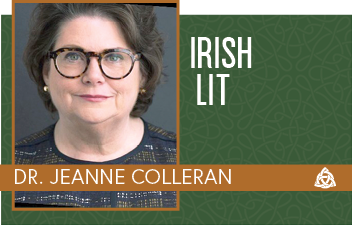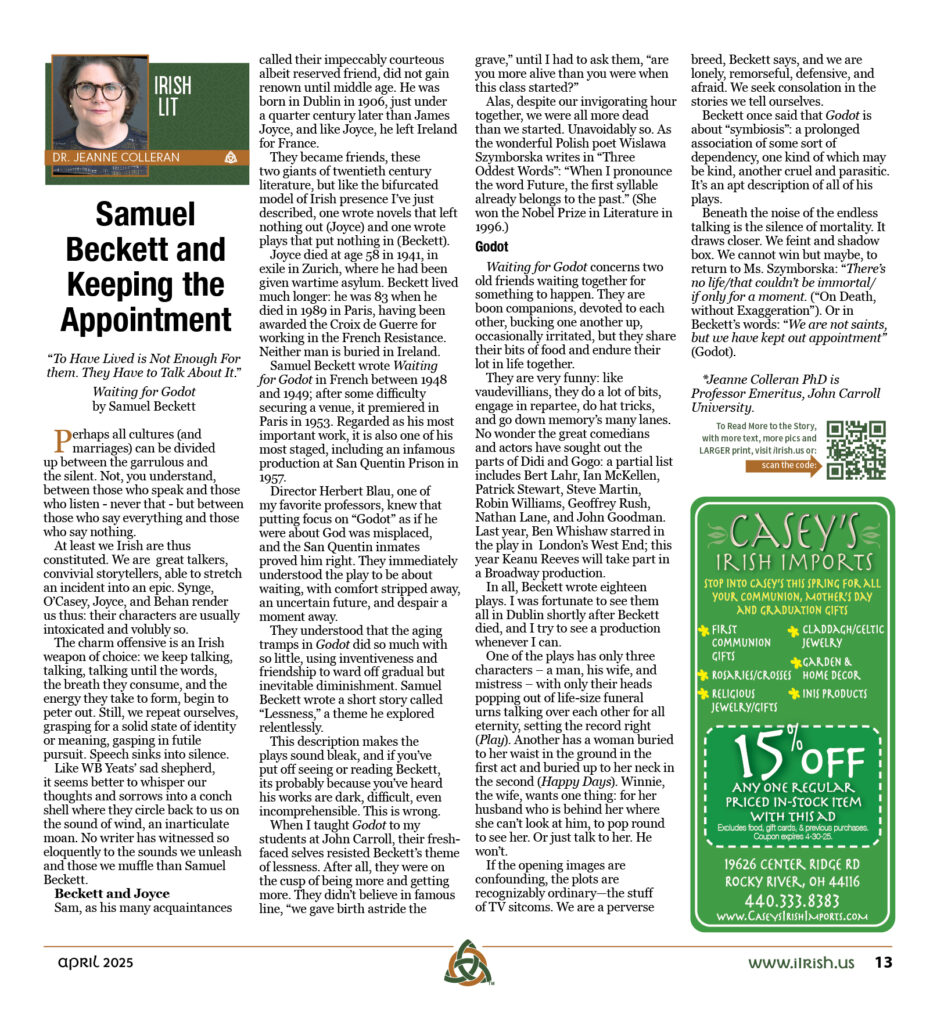
“To Have Lived is Not Enough For them.
They Have to Talk About It.”
Waiting for Godot by Samuel Beckett
Perhaps all cultures (and marriages) can be divided up between the garrulous and the silent. Not, you understand, between those who speak and those who listen – never that – but between those who say everything and those who say nothing.
At least we Irish are thus constituted. We are great talkers, convivial storytellers, able to stretch an incident into an epic. Synge, O’Casey, Joyce, and Behan render us thus: their characters are usually intoxicated and volubly so.
The charm offensive is an Irish weapon of choice: we keep talking, talking, talking until the words, the breath they consume, and the energy they take to form, begin to peter out. Still, we repeat ourselves, grasping for a solid state of identity or meaning, gasping in futile pursuit. Speech sinks into silence.
Like WB Yeats’ sad shepherd, it seems better to whisper our thoughts and sorrows into a conch shell where they circle back to us on the sound of wind, an inarticulate moan. No writer has witnessed so eloquently to the sounds we unleash and those we muffle than Samuel Beckett.
Beckett and Joyce
Sam, as his many acquaintances called their impeccably courteous albeit reserved friend, did not gain renown until middle age. He was born in Dublin in 1906, just under a quarter century later than James Joyce, and like Joyce, he left Ireland for France.
They became friends, these two giants of twentieth century literature, but like the bifurcated model of Irish presence I’ve just described, one wrote novels that left nothing out (Joyce) and one wrote plays that put nothing in (Beckett).
Joyce died at age 58 in 1941, in exile in Zurich, where he had been given wartime asylum. Beckett lived much longer: he was 83 when he died in 1989 in Paris, having been awarded the Croix de Guerre for working in the French Resistance. Neither man is buried in Ireland.
Samuel Beckett wrote Waiting for Godot in French between 1948 and 1949; after some difficulty securing a venue, it premiered in Paris in 1953. Regarded as his most important work, it is also one of his most staged, including an infamous production at San Quentin Prison in 1957.
Director Herbert Blau, one of my favorite professors, knew that putting focus on “Godot” as if he were about God was misplaced, and the San Quentin inmates proved him right. They immediately understood the play to be about waiting, with comfort stripped away, an uncertain future, and despair a moment away.
They understood that the aging tramps in Godot did so much with so little, using inventiveness and friendship to ward off gradual but inevitable diminishment. Samuel Beckett wrote a short story called “Lessness,” a theme he explored relentlessly.
This description makes the plays sound bleak, and if you’ve put off seeing or reading Beckett, its probably because you’ve heard his works are dark, difficult, even incomprehensible. This is wrong.
When I taught Godot to my students at John Carroll, their fresh-faced selves resisted Beckett’s theme of lessness. After all, they were on the cusp of being more and getting more. They didn’t believe in famous line, “we gave birth astride the grave,” until I had to ask them, “are you more alive than you were when this class started?”
Alas, despite our invigorating hour together, we were all more dead than we started. Unavoidably so. As the wonderful Polish poet Wislawa Szymborska writes in “Three Oddest Words”: “When I pronounce the word Future, the first syllable already belongs to the past.” (She won the Nobel Prize in Literature in 1996.)
Godot
Waiting for Godot concerns two old friends waiting together for something to happen. They are boon companions, devoted to each other, bucking one another up, occasionally irritated, but they share their bits of food and endure their lot in life together.
They are very funny: like vaudevillians, they do a lot of bits, engage in repartee, do hat tricks, and go down memory’s many lanes. No wonder the great comedians and actors have sought out the parts of Didi and Gogo: a partial list includes Bert Lahr, Ian McKellen, Patrick Stewart, Steve Martin, Robin Williams, Geoffrey Rush, Nathan Lane, and John Goodman. Last year, Ben Whishaw starred in the play in London’s West End; this year Keanu Reeves will take part in a Broadway production.
In all, Beckett wrote eighteen plays. I was fortunate to see them all in Dublin shortly after Beckett died, and I try to see a production whenever I can.
One of the plays has only three characters – a man, his wife, and mistress – with only their heads popping out of life-size funeral urns talking over each other for all eternity, setting the record right (Play). Another has a woman buried to her waist in the ground in the first act and buried up to her neck in the second (Happy Days). Winnie, the wife, wants one thing: for her husband who is behind her where she can’t look at him, to pop round to see her. Or just talk to her. He won’t.
If the opening images are confounding, the plots are recognizably ordinary—the stuff of TV sitcoms. We are a perverse breed, Beckett says, and we are lonely, remorseful, defensive, and afraid. We seek consolation in the stories we tell ourselves.
Beckett once said that Godot is about “symbiosis”: a prolonged association of some sort of dependency, one kind of which may be kind, another cruel and parasitic. It’s an apt description of all of his plays.
Beneath the noise of the endless talking is the silence of mortality. It draws closer. We feint and shadow box. We cannot win but maybe, to return to Ms. Szymborska: “There’s no life/that couldn’t be immortal/if only for a moment. (“On Death, without Exaggeration”). Or in Beckett’s words: “We are not saints, but we have kept out appointment” (Godot).




